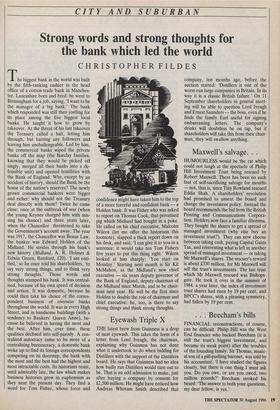CITY AND SUBURBAN
Strong words and strong thoughts for the bank which led the world
CHRISTOPHER FILDES
The biggest bank in the world was built by the fifth-ranking cashier in the head office of a cotton-trade bank in Manches- ter. Lancashire born and bred, he went to Birmingham for a job, saying, 'I want to be the manager of a big bank.' The bank which responded was still then jostling for its place among the five biggest local banks. He taught it how to grow by takeover. At the threat of his last takeover the Treasury called a halt, letting him through, but barring any followers and leaving him unchallengeable. Led by him, the commercial banks wiped the private banks off the map (the Barclay families, knowing that they would be picked off singly, merged all their banks into a de- fensible unit) and opened hostilities with the Bank of England. Why, except by an accident of history, should the Bank be the home of the nation's reserves? The newly grown commercial bankers were bigger and richer: why should not the Treasury deal directly with them? Twice he came close: once at the outbreak of war (when the young Keynes charged him with mis- sing his chance) and three years later, when the Chancellor threatened to take the Government's account away. The year was 1917, the Chancellor was Bonar Law, the banker was Edward Holden of the Midland. He strides through his bank's new history (Midland, A. R. Holmes & Edwin Green, Batsford, £20). 'I am enti- tled,' so he once told his shareholders, 'to say very strong things, and to think very strong thoughts.' Those words and thoughts stamped his bank. It was central- ised, because of his own speed of decision and action. It was domestic, because he could then take his choice of the corres- pondent business of overseas banks throughout the world. It was in every High Street, and in handsome buildings (with a tendency to Bankers' Queen Anne), be- cause he believed in having the most and the best. After him, over time, these qualities declined into self-parody. A cen- tralised autocracy came to be more of a centralising bureaucracy, a domestic bank woke up to find its foreign correspondents competing on its doorstep, the bank with the most and the best had the highest and most intractable costs. Its historians resist, until admirably late, the law which makes business histories grow in euphemism as they near the present day. They find a word for Tom Fisher, whose force and confidence might have taken him to the top of a more forceful and confident bank — a Holden bank. It was Fisher who was asked to report on Thomas Cook, that privatised pig which Midland had bought in a poke. He called on his chief executive, Malcolm Wilcox (let me offer the historians this footnote), slapped a thick report down on his desk, and said, 'I can give it to you in a sentence: it would take ten Tom Fishers five years to put this thing right.' Wilcox looked at him sharply: 'You start' on Monday.' Starting next month is Sir Kit McMahon, as the Midland's new chief executive — six years deputy governor of the Bank of England, deputy chairman of the Midland since March, and to be chair- man next year. He will be the first since Holden to double the role of chairman and chief executive: he, too, is there to say strong things and think strong thoughts.








































 Previous page
Previous page